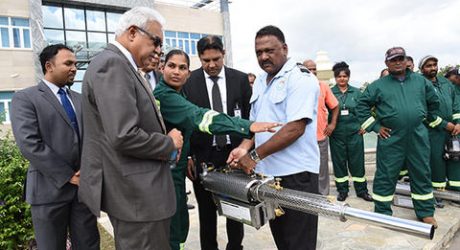By Rhondor Dowlat
A particular strain of dengue that causes hemorrhagic fever should hit T&T this year.
This was disclosed by the Minister of Health Terrence Deyalsingh at a media conference on the ministry’s 2017 strategy to treat with mosquito borne diseases.
The briefing was held at the conference room of the Insect Vector Control Division (IVCD) in Cunupia.
Deyalsingh said IVCD officials, along with health officials, are busy gearing up to continue the robust fight against the aedes aegypti mosquito.
He added that in a bid to combat and/or prevent this outbreak, the IVCD, in 2017 will be making use of a geographic information system (GIS), electronic monitoring system. The GIS is being used to map cases and to distinguish epidemiological clusters.
The system, Deyalsingh said, cost the ministry just under TT$1 million to come on stream— a project, he said, was stalled for two to three years.
He said, “It’s only in October 2016 we began using this system and we are able to provide a map. If we had this in 2015 our response to Zika last year would have been much better.
“With this, not only we can predict but we can act before.
“It is predicted that a particular strain of dengue that circulates every five to seven years should hit us this year and that strain of dengue causes hemorrhagic fever and we don’t want people bleeding out,” Deyalsingh said.
Last year, according to the IVCD’s Registrar Dr Naresh Nandram, there were 717 confirmed cases of Zika, with the highest number 197 being recorded in the St George West county. Among pregnant women, there was a total of 462 cases in 2016, the highest recorded, also in the county of St George West, totalling 99.
With respect to the dengue virus, there were 929 cases, 57 of which were confirmed in 2016. Reports of people contracting Chikungunya in 2016 were 109, 33 of which was confirmed.
After the media conference, Deyalsingh was escorted to the spacious carpark area where he was shown some of the brand new 45 thermal foggers that were acquired by the IVCD for ground spraying.
More Info
Dengue fever is a mosquito-borne tropical disease caused by the dengue virus. Symptoms typically begin three to 14 days after infection.
This may include a high fever, headache, vomiting, muscle and joint pains, and a characteristic skin rash. Recovery generally takes two to seven days.
In a small proportion of cases, the disease develops into the life-threatening dengue hemorrhagic fever, resulting in bleeding, low levels of blood platelets and blood plasma leakage, or into dengue shock syndrome, where dangerously low blood pressure occurs.(Trinidad Guardian)














